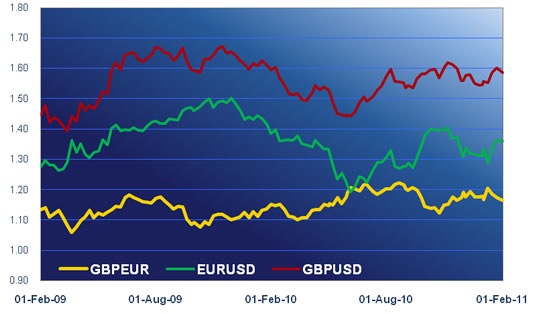As China began airlifting 30,000 workers from Libya and India shipped out 1,000 of its people the EU has been left looking somewhat inept. Britain has had to borrow an aeroplane from BP and the Royal Navy will not dock in Tripoli without written permission from the president. Ireland sent a plane yesterday but could not find anyone to rescue. The EU High Commissioner, in something less than a tour de force of oratory, said Mr Gadaffi was a very naughty boy and threatened to stop buying his oil unless he immediately reinstated internet access.
| Technical levels | |||||||||||||
|
|||||||||||||
| Economic releases | |||||||||||||
|
|||||||||||||
Not that she needed to bother: According to reports, Libyan oil production is already down by between a half and two thirds. That is especially bad news for Italy and Ireland, each of which imports nearly a quarter of its needs from the country. US crude broke the $100 barrier and Brent briefly topped $110 a barrel. Needless to say, the scare-mongers are lining up to predict oil prices could double from current levels if the domino effect continues through the region. Saudi Arabia’s ruler is doing his best to ensure he will not be one of the victims. On Wednesday he spontaneously promised to spend an extra $400 billion over the next three years to improve education, healthcare and infrastructure and promised his serfs an immediate $36 billion for higher wages and individual benefits. King Abdullah wants to be known as one of the nicest dictators around.
Niceness might not be enough to ensure survival though. Look at what happened to Charles I. That concern continues to exercise not just the oil market but the financial world in general. Again yesterday equity prices slid as investors offloaded more risk. And again they failed to rush for what was once considered the safety of the US dollar. They were alright about the yen and the Swiss franc and ambivalent about the pound.
Sterling did tick all the available boxes. British Bankers’ Association mortgage approvals were steady at 28.9k in January after a small upward revision to December’s numbers and the minutes of February’s Monetary Policy Committee (MPC) meeting were up to expectations. Adam Posen still voted for an extension to the asset purchase programme but three members voted for an increase in the Bank Rate. Spencer Dale, the Bank’s chief economist, joined Martin Weale in voting for a 25 basis point rise while Andrew Sentance upped the ante, preferring a half percentage point rise. The news enabled sterling to spike higher but was not sufficiently groundbreaking to keep it up there.
With bigger events to occupy them investors paid little attention to a 2.1% increase in Euroland industrial new orders and a 2.7% rise in the number of US existing home sales. The Australian Conference Board’s leading index improved from 0.2% to 0.7% in December but revolutionary tensions kept the commodity currencies, including the Aussie, out of contention. This morning Germany announced its first revision to first quarter gross domestic product which left growth unchanged at 0.4% for the quarter.
Swiss employment in the fourth quarter of 2010, the CBI’s reported sales and Brussels’ confidence figures are the only European data today, none of them particularly important. The US delivers new home sales, weekly jobless claims and the ever-unpredictable durable goods orders.
The early signs this morning are that sterling has maxed out its interest rate card. Everything expected by investors has been delivered and they are now turning their attention to the hardening line from the European Central Bank. It need not necessarily mean a downturn for the pound but it does imply that further upward progress will be harder to achieve.






